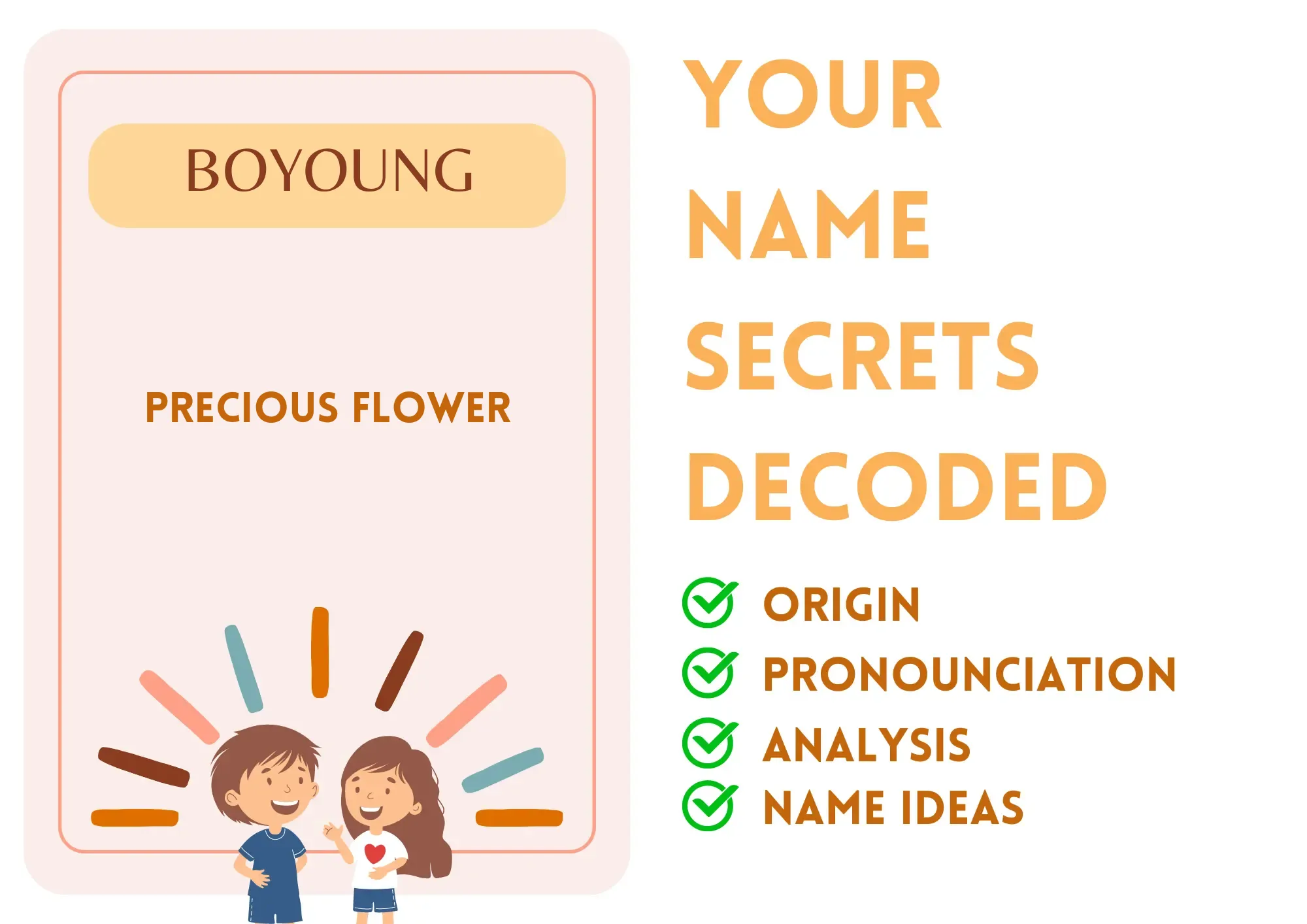
Boyoung
Boyoung is a name of Korean origin, which is typically unisex, although it is often given to boys. In Korean, ‘bo’ can mean ‘treasure’ or ‘precious’, and ‘young’ can denote ‘flower’ or ‘eternal’, leading to a symbolic meaning of ‘precious flower’. The name holds a special cultural significance in South Korea, often associated with beauty and cherished qualities. Boyoung reflects a connection to nature and is often chosen for its melodic sound and meaningful connotations.
Generally viewed positively, those with the name Boyoung are thought of as gentle, kind, and loving. The name is relatively easy to write in both Hangul (보영) and in Roman letters, contributing to its appeal.
Basic Information
Gender: Unisex
Sounds Like: BOH-yong
Pronunciation Explanation: The name is pronounced with emphasis on the first syllable 'BOH', followed by a lighter 'yong'.
Summary and Meaning
Meaning: precious flower
Origin: Boyoung has origins in the Korean language and culture, where names are often reflective of desirable traits or natural elements.
Usage: Boyoung is primarily regarded as a masculine name in Korea, but it is increasingly accepted as unisex.
Name Number (Chaldean)
Name Number (Pythagorean)
Popularity (Global Rank)
Overall: 61773
Boys: 45944
Girls: 77177
Most Popular in
Religious and Cultural Significance
Religion: Korean Buddhism/Spirituality
Background: In Korean culture, names such as Boyoung may carry spiritual significance, often chosen with values and positive traits in mind.
Cultural Significance: Boyoung holds cultural relevance in Korean society, seen as a name that embodies beauty and preciousness, traits highly valued in familial and social contexts.
Historical Significance: While Boyoung does not necessarily have a direct historical figure associated with its name, it embodies traditional values of beauty and nature that have been praised in Korean literature and poetry for centuries.
Popular Culture
Literature and Mythology: The name Boyoung could appear in various Korean literature as a character embodying beauty and preciousness.
Movies and Television: Characters named Boyoung have appeared in Korean dramas and films, typically portrayed as kind-hearted individuals who embody strength and compassion.
Feelings and Perceptions
Perception: Boyoung is generally perceived positively. It evokes feelings of endearment and gentleness.
Positive Feelings: Charming, gentle, precious, nurturing, beautiful, harmonious.
Negative Feelings: Some may find it slightly challenging to pronounce or spell correctly, especially outside of Korean-speaking communities.
Practical Considerations
Ease of Writing and Calling: Boyoung is simple to pronounce and write, although it has a slight complexity in its syllables for non-native speakers. In Hangul, it is written as 보영.
Common Typos and Misspellings: Boyung,Boyong,Booyoung,Bonyoung
Common Nicknames: Bobo,Young,Bo
Boyoung Popularity
Boyoung Usage and Popularity By Country
| Country | Rank (Overall) |
|---|---|
| South Korea | 359 |
| Mongolia | 5388 |
| Paraguay | 6725 |
| Senegal | 10065 |
| Finland | 10118 |
| New Zealand | 15666 |
| Poland | 16125 |
| Vietnam | 17288 |
| Japan | 26195 |
| Norway | 27537 |
Boyoung Usage and Popularity By City
| City | Rank (Overall) |
|---|---|
| New York | 15864 |
| Los Angeles | 15115 |
| London | 25094 |
| San Francisco | 15585 |
| Washington | 15161 |
| State College | 1184 |
| Vancouver | 9805 |
| Helsinki | 4352 |
| Atlanta | 23447 |
| Dallas | 21636 |
Compatibility Analysis
Famous Persons Named Boyoung
No results found for Boyoung.
Related Names
Similar Sounding Names:
Boyoon,Bongyoung,Bojin,Boseong